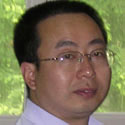Advisory Board and Editors Natural Resource Management

Louise Willemen
Department of Natural Resources, Faculty of Geo-Information and Earth Observation, of University of Twente, the Netherlands.PhD in spatial modelling from Wageningen University, the Netherlands.Worked before @ Bioversity International in Colombia, the European Commission’s Joint Research Centre in Italy, Cornell University in the USA.Current roles: Coordinating Lead Author of the Land Degradation and Restoration assessment of IPBES, Chair of the Steering Committee of Ecosystem Services Partnership, and editorial work for several journals. Ecosystem services and rural development researcher. Current research includes RS-based ecosystem service mapping and monitoring, impact assessments of integrated restoration, and prioritization of investments in land degradation neutrality actions.

Matthew D Wilson
Matthew (Matt) Wilson is a Professor in Spatial Information and Director of the Geospatial Research Institute Toi Hangarau at the University of Canterbury in Christchurch, New Zealand. He is a surface water hydrologist and geographical information scientist with specialisations including flood risk, surface water dynamics, water resources, remote sensing, numerical model development, uncertainty analysis and the assessment of the potential impacts of climate change. Previous research has included the assessment of the potential impacts of climate change on flood risk and water resources in the Caribbean and the analysis of surface water hydrodynamics on a 300 km reach of the Amazon River in Brazil. In New Zealand, his current research includes leading the uncertainty theme for a national scale flood risk assessment, the creation of a digital twin for flood resilience, and the creation of algorithms for processing of novel airborne GNSS reflectometry measurements for estimation of soil water content.

Jianhua Xu
Jianhua Xu is Professor of Geography and Director of The Research Center for East-West Cooperation in China. He has published 16 books and more than 200 papers. He has worked as the editor of several academic journals, such as Journal of Desert Research, Areal Research and Development, Human Geography, Ecologic Science, Arid Land Geography, Chinese Geographical Science, Journal of Signal and Information Processing, PeerJ, International Journal of Ecology and Ecosolution, etc.

Hong Yang
Dr. Hong Yang is a Associate Professor in Environmental Science, Department of Geography and Environmental Science, University of Reading, UK. His research interests include the effects of climate change and human activities on water environment, water-energy-carbon nexus, and resource management. He has led and been involved in research projects funded by UK Natural Environment Research Council (NERC), Scottish Natural Heritage (SNH), European Research Council (ERC), Research Council of Norway (RCN), Chinese Natural Science Foundation (CNSF) and Chinese Academy of Science (CAS).

Sercan Yapıcı
Sercan Yapıcı completed his PhD in 2017 with a thesis entitled "Determination of bio-ecological aspects and food interactions of Randall's threadfin bream (Nemipterus randalli) and common pandora (Pagellus erythrinus) in the Gokova Bay”.
He is a researcher at Mugla Sıtkı Koçman University, Faculty of Fisheries since 2010. His main interest topics are non-native species in the Mediterranean Sea; risk analysis on marine bioinvasion.

Nasim Ahmad Yasin
Dr. Nasim Ahmad Yasin is a Associate Professor at the University of the Punjab carrying out research in the field of Horticulture and Environmental Science.
Educational background:
2021-2022: Post-Doctorate: Vegetable Research Institute, Guangdong Academy of Agricultural Sciences, China.
2015: PhD: Institute of Agricultural Sciences: University of the Punjab Lahore.
1997: MSc. (Hon): University College of Agriculture, Rawalakot: The University of Azad Jammu and Kashmir –Muzaffarabad Azad Kashmir.
1995: BSc. (Hon): Barani Agriculture College, Rawalpindi. University of Agriculture, Faisalabad.

Nigel G. Yoccoz
Professor of Statistical Ecology at the Institute of Arctic and Marine Biology of UiT The Arctic University of Norway since 2003. Associate Editor of "Methods in Ecology and Evolution", "Ecography" and "Wildlife Biology", and former associate editors of Ecology and Ecology Letters.

Jianjun Zhang
Professor at the School of Land Science and Technology, China University of Geosciences (Beijing).
I work on land use and sustainability, ecological modeling, land economics and regional planning, low-carbon land use and ecosystem services in human disturbance zones, urban management. The focus of my current research has been expanded to green infrastructures, ecologic economics and heat island effects related with land use.

Chris B Zou
Professor of Watershed Hydrology and Ecohydrology at the Department of Natural Resource Ecology and Management, Oklahoma State University.

Matteo Zucchetta
Matteo Zucchetta obtained his PhD thesis entitled "Habitat distribution models for the management of fishery and conservation concern species in lagoon environment” at the University Ca’ Foscari Venice (Italy). He has previously covered the position of researcher University Ca’ Foscari Venice (Department of Environmental Sciences, Informatics and Statistics) and at the National Centre for Coastal Zone Protection and Characterization, Marine Climatology and for Operational Oceanography of the Italian Institute for Environmental Protection and Research (ISPRA). Since 2020 he is a researcher of the Institute of Polar Sciences of the National Research Council of Italy. His work was carried out in the framework of different EU and Italian projects, and his main research topics are: 1) analysis of the spatial distribution of plant and animal species in coastal and transitional water bodies; 2) Community ecology in transitional water ecosystems; 3) Use of fish fauna assemblages as indicators of ecosystem ecological status; 4) Ecological models for food webs analysis; 5) Climate changes effects on aquatic ecosystems.

